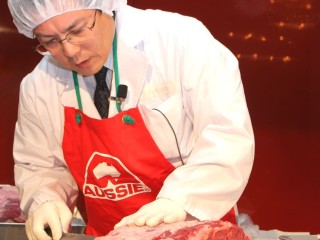 JBS Australia’s Iain Mars also singled-out Government fees and charges for mention during his recent address to the Australian Agribusiness Association on the beef sector’s international competitiveness (see separate story “Controlling costs key to export competitiveness”).
JBS Australia’s Iain Mars also singled-out Government fees and charges for mention during his recent address to the Australian Agribusiness Association on the beef sector’s international competitiveness (see separate story “Controlling costs key to export competitiveness”).
He said taxes and charges were impacting on JBS Australia’s ability to compete on the world stage, particularly in areas like carbon tax, meat inspection and industry costs.
“The Federal Government recently passed on the full cost of AQIS meat inspection to export processors. That’s going to increase those costs to our company from $6 million a year to $10 million – a $4 million additional cost, that we somehow have to recover,” he said.
Despite Government’s claims that the carbon tax would not affect rural industries, the direct tax on larger meat processors through emissions payments would cost JBS Australia at least another $8 million each year, Mr Mars said.
JBS Australia is also the nation’s largest transaction levy and slaughter levy payer – contributing $1.5 million in cattle transaction levies (representing 300,000 cattle – mostly grainfed) and $3.6 million in slaughter levies.
“A recent media report questioned the appropriateness of MLA sharing some of its R&D co-funds with JBS – that was an insignificant amount of money compared with the $5 million-plus we pay each year in industry levies,” he said.
Value for money
“But industry must work together to obtain maximum value from its levies. We don’t mind paying levies to MLA, ALFA and AMPC, but we must get value for them. I would have no objection to paying an even higher levy, provided I was convinced we were getting value for money.”
Mr Mars said working with the organisation, rather than against it, was one way of delivering greater value on investment.
One of the reasons he had accepted a position on the MLA board last year was that it was ‘easy to sit on the outside and throw stones, if you don’t thoroughly understand an organisation.’
“I think MLA is a world-class organisation, and I think it at times has received unfair criticism for what it is doing on industry’s behalf. There is often confusion within the broader industry about where its focus is and where its responsibilities lie. But it is a great opportunity to work within the organisation to help give it focus for the benefit of whole of industry,” he said.
“We can sit around and whinge about currency movements and things happening worldwide that are out of our control, but we are better-off focussing on costs and issues that we can control, to improve our business,” he said.
“Within our sector, processing, there are a lot of costs that we can control, and if we manage our business well, we can reduce those costs, despite the high currency value and the competitive global environment in which we operate.”
The processing sector needed to be more innovative in managing those costs, whether that be through human resources management, or more effective marketing of products, he said.
Drive to optimise boning room yields
During questiontime, Mr Mars touched on other areas of JBS Australia’s performance that could impact on its global competitiveness.
Just one of these was the need to optimise boning room yield from each carcase, and the opportunity to pick-up ideas to improve yields from the company’s sister businesses overseas.
“We constantly benchmark our business every day within Australia, and monthly against what our operations in North and South America area doing, in areas like carcase yield,” he said.
“Here in Australia we’re doing a good job, but there are still lots of room for improvement. I made a comment two years ago during a speaking engagement about how much we had improved carcase yields per animal, in the two years since JBS had started in Australia in 2007. Today, we have moved forward another step from that point.”
“We thought we had reached an acceptable standard, but we haven’t got there yet – it’s a process of continuous improvement. There is still so much we can do within our businesses to do thing better.”
JBS recently did a complete yield test for all of its Australian factories, examining and boning every cut with ‘surgical precision’ to see what was in fact possible, in a process that took four months.
“We have now seen the results of that exercise, and I am really pleased, because it shows how much more we can still do in areas like yield,” Mr Mars said.
“One of the most exciting aspects about our industry today is that there is still so much more room for improvement, in many areas.”
